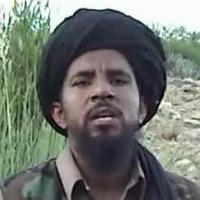BOB GARFIELD: And I’m Bob Garfield. The White House announced this week the death of Al Qaeda’s number two operative in Pakistan.
MALE CORRESPONDENT: The U.S. has eliminated another prominent terror figure.
FEMALE CORRESPONDENT: U.S. officials believe his death is so significant…
MALE CORRESPONDENT: Press Secretary Jay Carney would not confirm how al-Libi died.
BOB GARFIELD: Here’s a hint: The U.S. did not use secret border- crossing karate operatives. The government killed al-Libi the way it kills most enemies of the state in the Obama era, via targeted drone attack. New York Times reporter Scott Shane says that the administration calls the program classified but talks about it, coyly, all the time. He says it’s like a striptease, a striptease that looks increasingly absurd, as news stories about drone strikes proliferate seemingly everywhere.
SCOTT SHANE: Drone strikes are reported within minutes or hours by the Pakistani media, by wire services. President Obama went on YouTube and Google+ back in January and surprised people by talking about how precise the drone strikes against Al Qaeda were. Leon Panetta, the defense secretary, and a number other officials have often blurted something out about the program, so the question has sort of increasingly become why is this program classified. And, and there are quite a few intelligence officials who are wondering about that.
BOB GARFIELD: In that press conference, when Secretary Panetta did articulate something close to a new security doctrine, in justifying the strikes as protection of U.S. sovereignty, this, as opposed to violating Pakistani sovereignty, it struck me as some sort of Obama doctrine - we will bomb North Waziristan or Piccadilly Circus or you-name-it, if it means protecting American lives. And yet, we’re in this bizarre circumstance where members of Congress are not even able to debate the subject.
SCOTT SHANE: Well, of course, they would say that they do discuss it behind closed doors. What they haven’t been able to do is have a public discussion, a public debate. And the drone strikes, and certainly what appears to be the first major use of a cyber attack by the United States against the Iranian nuclear program, both of those are new kinds of weapons that raise extremely complex legal questions, moral questions, and are exactly the kind of thing that you would think Congress would want to debate publicly and make decisions about.
BOB GARFIELD: I’m glad you raised the cyber warfare issue. Its revelation by your colleague David Sanger resulted in Sanger feeling obliged to say that he had gotten this story himself and had been working on it for a year and himself approached the administration for comment, as opposed to being fed the story Scooter Libby style. How did we get to this place [LAUGHS] Scott, where a reporter feels compelled to reveal his unsource?
SCOTT SHANE: Well, I sort of sympathize with David because Joe Becker, my colleague, and I who wrote about Obama’s counterterrorism record, you know, sort of face similar snide comments along the lines of, “Well, why did the White House decide to put out this story at this time?” And it is somewhat insulting for folks to suggest that this was somehow handed to us on a silver platter.
As a reporter, you have a story idea, you go out and call different people, you talk to them, sometimes on the record, sometimes off the record, sometimes on background, and it is not as passive as sort of sitting by your phone and watching your email and waiting for leaks. And I think that with all the discussion of, of leaks, it sometimes gives people a completely false impression of what journalism is like.
BOB GARFIELD: In the introduction, I referred to your use of the word “striptease” to describe the “show here, obscure there” approach to classified information. You could also have used harsher language, considering the administration’s extremely vigorous prosecutions of whistleblowers. This is a president who came to office vowing unprecedented levels of transparency. Is there a hypocrisy charge to be made here?
SCOTT SHANE: I think the dilemma that the Obama Administration, and any administration faces is, on the one hand, you know, they love to do all this stuff secretly. Sometimes that’s necessary, although I think most government officials would say not nearly as often as is claimed. But, at the same time, citizens have some right to know what their government’s doing with their money and in their name.
And so, the government – you know, for example, the Obama Administration officials have given half a dozen speeches sort of around the drone program, the targeted killing program. I think what’s happened is we’ve kind of reached a point where even inside the government perhaps the weight of opinion is tilting towards simply making the whole program unclassified.
BOB GARFIELD: Scott, thank you so much.
SCOTT SHANE: Thank you very much.
BOB GARFIELD: Scott Shane is a reporter for the New York Times.
